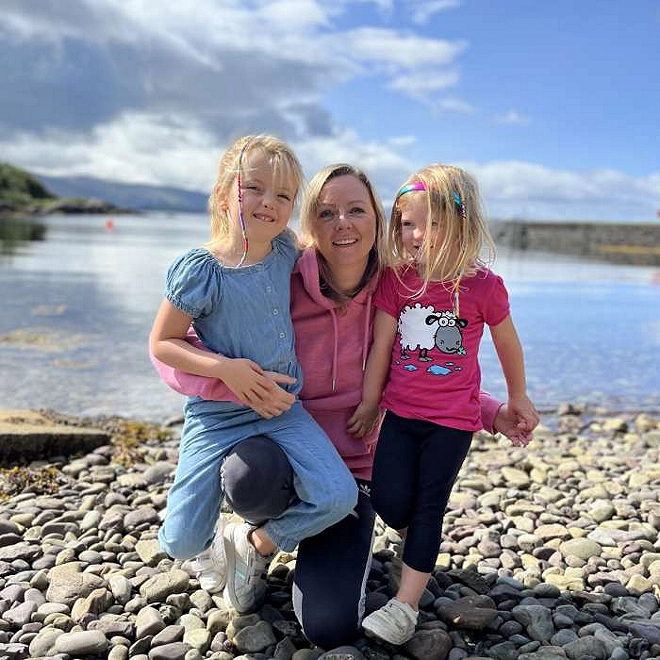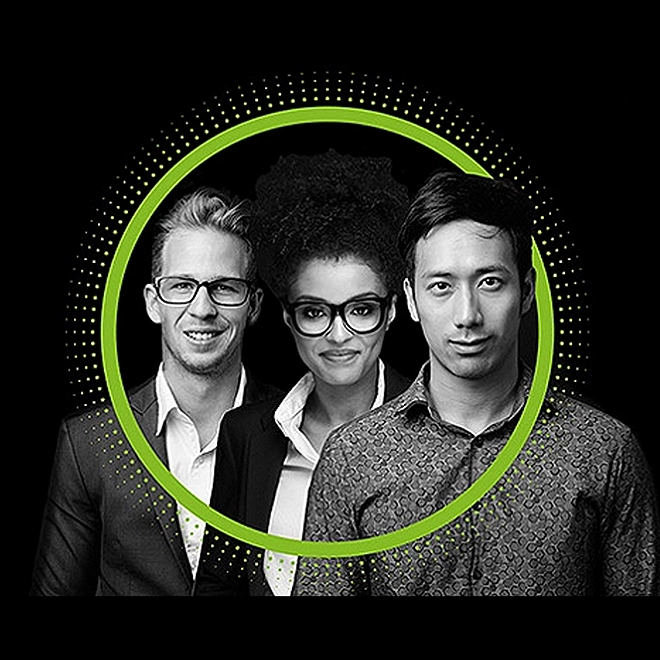Five Turning Points of My Career
with Nikki Gibney
Deloitte’s Chief Sales and Marketing Officer, Nikki Gibney discusses the power of asking questions, how she learned to delegate, and why taking a walk can be the key to building relationships.
"Don’t be afraid of what you don't know."
When I look back at my career and - even where I am now - I sometimes joke that I’ve never really known what I want to be when I grow up. I’m someone who likes to try out different things so trying to pin down a single path that fits was never something that I was going to get to.
I decided to do a general business course at Trinity, and the two classes I really enjoyed were ‘organisational change and culture’, which brought in psychology and change management, and marketing. In my final year, I went to an event and heard someone from Deloitte UK speak about human capital consulting, and instantly felt ‘this is it, this is the thing’.
Throughout my career, that organisational change and culture piece has played a huge part in how I have thought on my role. From working in consulting through to my current sales and marketing position, I love considering the psychology of what we are doing - ‘how is a client going to make this decision?’ or ‘how can we design a process or a communication in a way that increases our impact’. Understanding what motivates and engages others is critical.
I moved to London for that role, which was very freeing because you weren’t anything to anyone over there, you had to forge your own path - but it was also quite scary.
I remember sitting on my first day on a project in St Albans and my manager asked me to create a change impact template. I just sat there looking at the screen of my laptop thinking “I have no idea what I’m doing. I have no idea what a change impact assessment is. They are going to figure out I don’t know anything”.
That imposter syndrome and sense of being out of your depth can arise throughout your career, particularly as you move into more senior positions, but it’s also where you grow and learn. As a leader, we often feel that we should have all the answers, but I’ve seen that there is huge power in the ability to ask great questions, and challenge people on their thinking. And it’s freeing to know that you don’t have to bring all the answers to bring real value!

"Make space to step back and think."
I worked in Consulting for four years and had gone all in, both in my professional and personal life in London. I eventually realised that I wasn’t enjoying the intensity anymore. I knew it wasn’t the right place for me and I needed to figure out what that next step was.
I moved home to Ireland to do a diploma in Executive Coaching, and it’s really influenced me in terms of my work style, teaching me invaluable lessons in terms of how to really listen and connect with people, how to meet people where they are at, and how to ask questions.
I finished the course in 2010, which wasn’t ideal as Ireland was in recession and there were no jobs! I was back living with my Mum and was thinking ‘I left this really exciting job in London and now I’m living at home with no work and no idea what I want to do’.
It was a challenging time but also an important one. Throughout my career, I’ve found that finding space to take a step back can be so valuable. The world is so fast and intense that I think everyone can benefit from the space to step back and think.
More recently, I found that while my maternity leave gave me space to be with my kids, it also gave me space to think about my role and what was important. I was listening to marketing podcasts, getting inspired and gained a valuable perspective in terms of where I needed to focus when I returned.
I’d love to see a similar approach to paternity leave and sabbaticals, as I think it would help hugely in terms of equality. Several Deloitte partners, including our CEO, took sabbaticals over the summer this year, and I think that is brilliant role modelling for the value of taking time out.

"Find the moment and don’t be afraid to ask."
In late 2010, I got a call from Deloitte in Ireland about joining the Irish Consulting business and I decided to give it a go. I really enjoyed it but after two years, I had a chance encounter that would take me on another route.
I went to the launch of a not-for-profit and a powerhouse of a woman called Caroline Casey stood up to discuss a new business network called Kanchi that she was setting up. It was focused on disability and inclusion, and the value that people with disabilities have, which isn’t always recognised. It’s something that I felt really passionate about because my Mum has Parkinson’s.
I was so inspired by Caroline that I stood up to speak during the session, and then I went up to her afterwards and said ‘I think what you’re doing is amazing, if you’re ever looking for someone - I would love to work for you’.
Caroline called me four months later to offer me the role running the business network. It wasn’t a clear-cut decision and I’m sure people thought I was crazy leaving a good job in Deloitte for a new project with a non-profit - but at the time, I didn’t have any kids or a mortgage - so I thought ‘if I’m going to take a chance, this is the time to do it’.
That role was the making of me. I didn’t have that layer of people around me that you get in a big firm, I was so exposed - but it taught me that sometimes you need to be bold and give things a try.
When I look at the big moves that I’ve made, I’ve always asked for them and I think it’s so important to say ‘I want this’. Over my career, I’ve applied for roles that I didn’t have the exact experience for and pushed for promotions that didn’t exist - it’s not always the easiest thing to put yourself out there but nobody is as invested in your career as you, and you can’t expect people to read minds!
However, when it comes to progressing your career, the most powerful thing you can do is deliver on the work and become a trusted and indispensable member of the team. When opportunities arise, things can move fast so you want people to see that you’re already operating at that level.

"Know your boundaries and trust your team."
As I finished up with the Kanchi network a few years later, the time came for me to take my next step and I was back asking the question ‘What do I want to do next?’.
I returned to Deloitte in a business development position, built out a new team and worked my way into a Director role.
I was five months pregnant when our Chief Marketing Officer left in 2020, and I really had to think about whether I wanted to go for it and take on a broader role in the business.
I eventually realised I was going to regret it if I didn’t go for it, and I was announced as Chief Sales and Marketing Officer on the day I went on maternity leave. It’s a credit to Deloitte that they made that decision even though, in the short term, it would have been a lot easier to give it to someone else.
I try to be that person for my team now and ensure that people don’t rule themselves out for opportunities just because they’re starting a family or need to take some time out. I’ve had conversations over the years where people have said ‘Well I guess I won’t go for that promotion now that I am expecting’ but it’s important to reinforce that just because you’re taking one path, it doesn’t mean that the other path isn’t still open to you.
Balancing work and family life means that you have to be strategic and intentional about how you spend your time – and it can be a struggle to find that balance!
Delegation hasn’t always come naturally to me, but I have worked hard to get better at it as it results in empowerment, and empowerment is critical in motivating a team and providing people with the opportunity to have fulfilling careers.
I’m a leader but I’m also a mum who needs to be home by a certain time and can’t do all of the hours, so it’s forced me to get comfortable with the fact that while there are things that I feel need to get done in a certain way, in most cases I need to hand over control. While someone might not do it the way I would do it, that’s ok. It creates space for other team members to work on really interesting stuff and they often do it better than I ever would because they bring a different perspective.

"An honest chat can solve most things."
I’ve thought a lot about what a CSMO does, what that role is for a business, and I’ve realised that there isn’t one defined way of doing it - it depends on the person, the role, the company and what they need at that time. Ultimately, my role is to get amazing people into the right roles, ensure they are focused on the right things, and clear obstacles out of their way.
I have learned that when I need to properly connect with a team member, whether to have a difficult conversation, or just check in with someone, that talking over a desk can be a barrier to real connection.
When I worked with Kanchi, I was having a difficult time with something, and Caroline could see me struggling. She came into the office and said, ‘let’s go for a walk’. We had the type of chat that you couldn’t have at your desk, and it taught me that if you’re experiencing challenges that you need to connect with people on a more human level. Sending emails back and forth will rarely resolve anything, but an honest chat can create real change.
Those walks are something that I’ve brought with me in my leadership toolkit. It’s not always about a difficult issue, but it’s my go-to if I want to connect with someone and understand what is really going on with them.
I think authenticity and honesty is just so powerful. If you’re the same as everyone else, you’ll never stand out. Since I encourage people to be really open about what they want, it’s equally important for me to be both candid and kind in how I respond to those conversations, even if it’s a difficult message. That creates trust, and as a leader, if your team trusts you, you can do anything together, because they know you have their back and you know that they have yours.
I love that my career has been full of change and possibilities and while I’m in a role that I love, I still have more than 20 years of my career left - who knows what that looks like?



